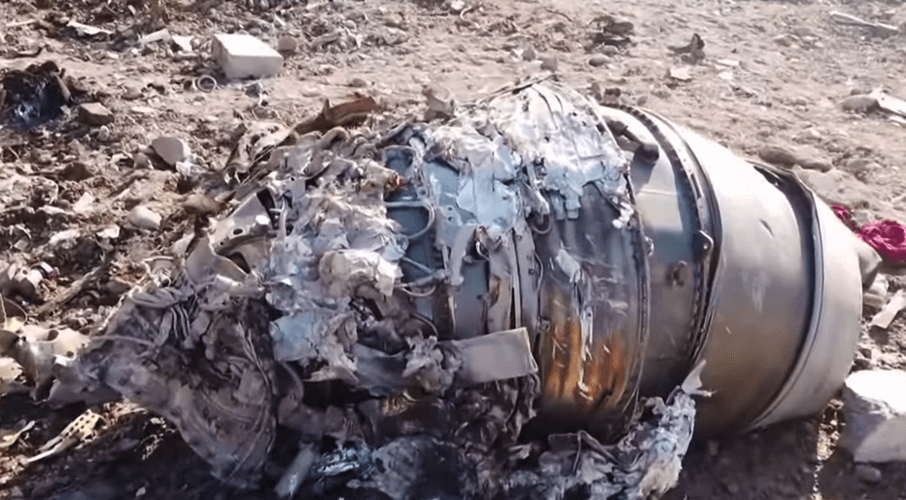 The shooting down of PS752 has shown graphically that Iran conducts terrorist acts at home also, where immunity and cover up are so much easier than abroad, writes Sarah Teich, Kaveh Shahrooz, and David Matas in the Toronto Sun.
The shooting down of PS752 has shown graphically that Iran conducts terrorist acts at home also, where immunity and cover up are so much easier than abroad, writes Sarah Teich, Kaveh Shahrooz, and David Matas in the Toronto Sun.
By Sarah Teich, Kaveh Shahrooz, and David Matas, December 6, 2021
The Islamic Revolutionary Guard Corps (IRGC) on Jan. 8, 2020 shot down Ukrainian flight PS752 just over the Tehran airport, killing all 176 on board. 138 had ties to Canada, including 55 citizens and 30 permanent residents.
A report just released by the Association of Families of the Victims concluded that the shooting was intentional. This conclusion raises the question why the IRGC would deliberately shoot down a passenger plane.
The answer to that question lies in the events both before and after the shooting. United States forces assassinated in Iraq on Jan. 3, 2020, Qasem Soleimani, head of the Quds Force of the IRGC, the branch of the IRGC charged with terrorist acts abroad.
Two days later, U.S. President Trump warned that, if Iran retaliated, they would face attacks on 52 targets. Early in the morning of the day that PS752 was shot down, the IRGC launched a missile attack on a U.S. military base in Iraq, Ayn al-Asad, giving the Americans advance warning of the attack.
After the attack on the U.S. base, Iran kept its airspace open to passenger planes. Then, IRGC security officials stationed at airport checkpoints began systematically asking boarding passengers if they had U.S. passports or were going to the U.S., something they had not done in the past.
The theocractic government of Iran has a long history of inflicting deaths on innocents, then both denying their responsibility and justifying the acts. In addition to the examples in the report, we note that, in 1988, the regime murdered several thousand innocents and then both denied responsibility for the murders and claimed the victims were enemies of God. One of the executioners was Ebrahim Raisi, the current President of Iran.
In 1994, Iranian agents organized a suicide bombing of the Jewish community centre in Buenos Aires, Argentina, killing 85 and injuring hundreds. Interpol red notices and extradition requests against the Iranian perpetrators remain outstanding. The regime denied its involvement and criticized its accusers as Zionist. One of those wanted for the bombing is Ahmad Vahidi, the current Iranian Minister of the Interior.
In June 2018, a meeting that one of us, David Matas, was attending in Paris, was the target of Iranian bombers, caught en route. One of the bombers, an Iranian diplomat, was convicted and sentenced in February this year to 20 years in prison by a Belgian court for the attempt. Again, while denying involvement, the Iranian regime referred to the meeting attendees as enemies of God.
Ukrainian secretary of the National Defence and Security Council Oleksiy Danilo stated, after interviewing Iranian officials, that Iran, through the shootdown, was looking to create a diversion which would bring a pause to a situation which they had escalated through the missile attack on the American missile base in Iraq earlier that day.
Then United Nations Special Rapporteur Agnes Callamard wrote to the government of Iran “Some may even wonder whether the flight was targeted purposefully, either because of something specific about it or perhaps to divert attention from the increasing hostilities between your Excellency’s Government and the United States and to let that tension cool.”
That is indeed what happened. The shooting down of PS752 became the ideal diversion because of its specific characteristics — a soft Western, but not American, target. Ukraine, at least currently, is politically aligned with the West. None of the passengers, the IRGC made sure, were American or going to the U.S.
Four days after PS752 was shot down, Hossein Salami, overall head of the IRGC, gave a speech in Parliament in which, while he claimed that the shooting down was an accident, stated that the goal of the IRGC was to seek revenge for the death of Quds Force head Soleimani in a timely fashion, without provoking the U.S. to act on its threat to strike 52 Iranian location.
He added that the IRGC wanted to strike in an unexpected way which avoided the expansion of conflict. The shooting down, we observe, ticked all of these boxes.
Canada designates only the foreign division of the IRGC as a terrorist entity. The shooting down of PS752 has shown graphically that Iran conducts terrorist acts at home also, where immunity and cover up are so much easier than abroad.
An immediate lesson that Canada should learn from the shooting down of PS752 with so many Canadian victims is the need to designate the IRGC as a whole, and not just its foreign division, as a terrorist entity.
Sarah Teich and Kaveh Shahrooz are senior fellows at the Macdonald-Laurier Institute. Sarah Teich is a legal advisor to the Canadian Coalition Against Terror. David Matas is a senior fellow at the Raoul Wallenberg Centre for Human Rights. All three are legal advisors to the Association of Families of the Victims of PS752.





